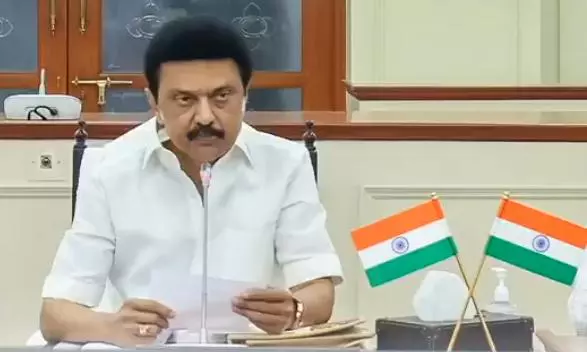An inclusive scheme as alternative to Vishwakarma
Explaining the idea behind the recommended changes, he said that the Vishwakarma scheme fixed the maximum age for applying for benefits under it as 18 years, which was an age the person should be studying with aspirations to take up big jobs and not be involved in a trade as craftsperson

Chennai: Kalaignar Kaivinai Thittam (Kalaignar Handicrafts Scheme), the State Government’s answer to the Prime Minister Vishwakarma Yojana, was unveiled by Chief Minister M K Stalin, who described the State initiative as one aimed at improving the socio-economic status of those practicing 25 traditional crafts by adhering to lofty principles like social justice, equal rights and human rights.
Launching the scheme at a government event in Kundrathur in Kanchipuram district on Saturday, Stalin explained that the Kalaignar Kaivinai Thittam (KKT) was formulated because the Union Government refused to accept the changes recommended by the State government in the Vishwakarma Yojana that it introduced in 2023 for artisans practicing 18 different crafts.
Explaining the idea behind the recommended changes, he said that the Vishwakarma scheme fixed the maximum age for applying for benefits under it as 18 years, which was an age the person should be studying with aspirations to take up big jobs and not be involved in a trade as craftsperson. So the KKT raised the age limit to 35 as the aspirant would be old enough to take a decision on their career.
Among the 25 trades listed in KKT are carpentry, boat building, metal work, lock making, sculpture, glass work, pottery, construction work, basket making, coir making and mat weaving, for which anyone with five years of experience in the trade could apply irrespective of their family practicing the trade for generations or not.
Stalin said that when Rajaji, former premier of the country, tried to introduce a scheme called ‘Kulakalvi Thittam,’ in the Madras Presidency it was opposed by leaders of the Dravidian movement because it deprived children the opportunity to come out of the parents’ traditional professions and explore opportunities in other areas.
The Vishwarkarma Yogna was also aimed at creating a similar situation by pushing 18 year old persons into the trades of their parents and not allowing them to study further and find jobs elsewhere, he said, adding that under KKT the aspirants would come to practice a traditional trade only after exploring opportunities in the job market and also acquiring academic qualifications from educational institutions.
Another change that the State government wanted to make in the Vishwakarma Yojana was the removal of the clause that the applicant should be from a family that practiced the trade traditionally, which in other words meant that they belonged to the caste that was associated with the craft, he said.
Since such a qualification would amount to perpetuating the caste system, besides agitating against social justice, the State government urged that to be removed but in vain and hence came up with the KKT that allowed anyone to practice any trade irrespective of the parent’s and family’s vocation, he said.
Another objection raised by the State government was that Vishwakarma beneficiaries would be certified as eligible candidates by the panchayat president. The demand to entrust the certification to the village administrative officials was rejected outright, though the recommendations were made in writing to the Union Minister for MSMEs, he said.
The alternative scheme of the State government, which would be implemented by the State MSME department, was inclusive and aimed at all round growth. Marking its launch, Stalin distributed to 8951 beneficiaries loan approval orders to the tune of Rs 170 crore. The beneficiaries who will also get subsidies worth Rs 34 crore.
Stalin also said that Tamil Nadu had 33 lakh MSME units, which formed 9.4 per cent of the country's total units. In the ranking Tamil Nadu was third in having the maximum MSMEs.

